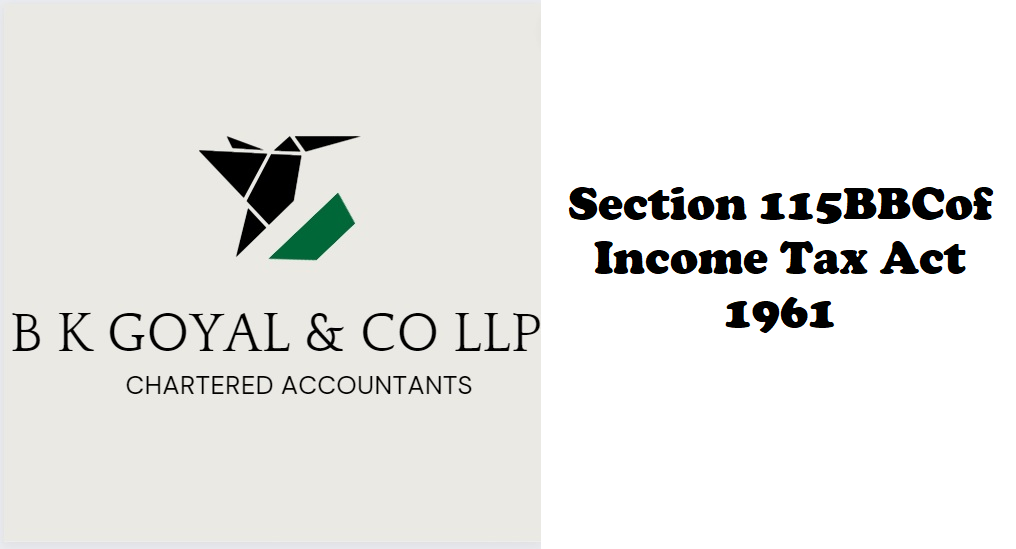Anonymous donations to be taxed in certain cases
(1) Where the total income of an assessee, being a person in receipt of income on behalf of any university or other educational institution referred to in sub-clause (iiiad) or sub-clause (vi) or any hospital or other institution referred to in sub-clause (iiiae) or sub-clause (via) or any fund or institution referred to in sub-clause (iv) or any trust or institution referred to in sub-clause (v) of clause (23C) of section 10 or any trust or institution referred to in section 11, includes any income by way of any anonymous donation, the income-tax payable shall be the aggregate of—
(i) the amount of income-tax calculated at the rate of thirty per cent on the aggregate of anonymous donations received in excess of the higher of the following, namely:—
(A) five per cent of the total donations received by the assessee; or
(B) one lakh rupees, and
(ii) the amount of income-tax with which the assessee would have been chargeable had his total income been reduced by the aggregate of anonymous donations received in excess of the amount referred to in sub-clause (A) or sub-clause (B) of clause (i), as the case may be.
(2) The provisions of sub-section (1) shall not apply to any anonymous donation received by—
(a) any trust or institution created or established wholly for religious purposes;
(b) any trust or institution created or established wholly for religious and charitable purposes other than any anonymous donation made with a specific direction that such donation is for any university or other educational institution or any hospital or other medical institution run by such trust or institution.
(3) For the purposes of this section, “anonymous donation” means any voluntary contribution referred to in sub-clause (iia) of clause (24) of section 2, where a person receiving such contribution does not maintain a record of the identity indicating the name and address of the person making such contribution and such other particulars as may be prescribed.
Understanding Anonymous Donations and Tax Implications under Section 115BBC of the Income Tax Act, 1961: A Comprehensive Guide for Indian Institutions
Navigating the Nuances of Anonymous Donations in India
In India, anonymous donations—contributions made without disclosing the donor’s identity—have distinct tax implications under Section 115BBC of the Income Tax Act, 1961. This section aims to curb the potential misuse of charitable institutions for money laundering or tax evasion.
Key Insights for Assessees:
- Applicability: Section 115BBC applies to eligible assessees, including universities, hospitals, educational or medical institutions, trusts, and funds, receiving anonymous donations.
- Tax Calculation:
- Anonymous donations exceeding the higher of 5% of total donations or ₹1 lakh are taxed at a flat rate of 30%.
- Additional tax is levied on the remaining income as if anonymous donations above the threshold were excluded.
- Exemptions:
- Religious trusts and institutions are exempt, except for anonymous donations specifically earmarked for universities, hospitals, or medical institutions they run.
Examples in the Indian Context:
Example 1: A charitable trust receives ₹2 lakhs in anonymous donations within a financial year. Its total donations for the year amount to ₹10 lakhs. The tax calculation would be:
- 30% tax on ₹1 lakh (exceeding 5% of total donations) = ₹30,000
- Regular tax on the remaining income, excluding the ₹1 lakh excess anonymous donation.
Example 2: A university receives an anonymous donation of ₹5 lakhs with a specific direction to use it for its medical research center. The university is exempt from Section 115BBC as it’s a religious and charitable institution.
Understanding “Anonymous Donation”:
It’s crucial to note that the term “anonymous donation” has a specific definition under Section 115BBC:
- It’s a voluntary contribution.
- The recipient doesn’t maintain a record of the donor’s identity (name, address, and other prescribed details).
Best Practices for Compliance:
- Maintain meticulous records of all donations, including donor details, to accurately determine tax liability.
- Seek guidance from a qualified tax professional for expert advice and compliance assurance.
Disclaimer:
To learn more one can refer the following resources:
1) Income tax efiling website
2) Income tax departement website
This information is intended for general knowledge purposes only and does not constitute professional tax advice. Consult a qualified tax advisor for accurate guidance tailored to your specific circumstances.
Practice area's of B K Goyal & Co LLP
Income Tax Return Filing | Income Tax Appeal | Income Tax Notice | GST Registration | GST Return Filing | FSSAI Registration | Company Registration | Company Audit | Company Annual Compliance | Income Tax Audit | Nidhi Company Registration| LLP Registration | Accounting in India | NGO Registration | NGO Audit | ESG | BRSR | Private Security Agency | Udyam Registration | Trademark Registration | Copyright Registration | Patent Registration | Import Export Code | Forensic Accounting and Fraud Detection | Section 8 Company | Foreign Company | 80G and 12A Certificate | FCRA Registration |DGGI Cases | Scrutiny Cases | Income Escapement Cases | Search & Seizure | CIT Appeal | ITAT Appeal | Auditors | Internal Audit | Financial Audit | Process Audit | IEC Code | CA Certification | Income Tax Penalty Notice u/s 271(1)(c) | Income Tax Notice u/s 142(1) | Income Tax Notice u/s 144 |Income Tax Notice u/s 148 | Income Tax Demand Notice

